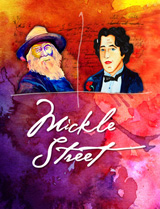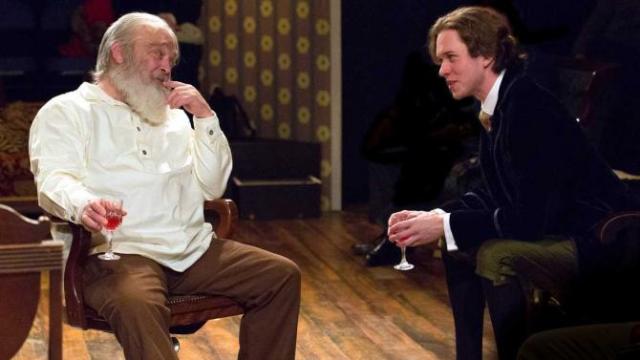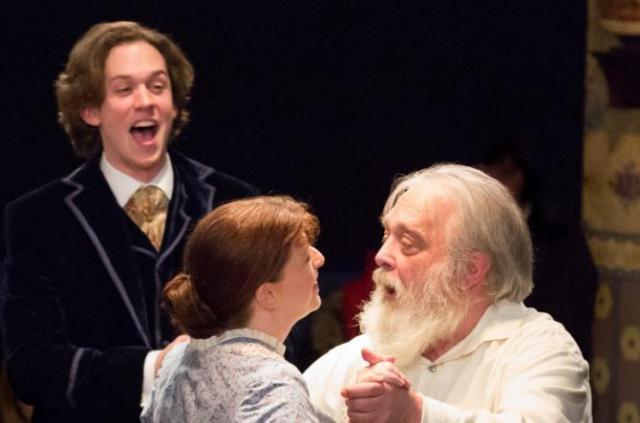


Walt Whitman and Oscar Wilde met once and talked for several hours. In Mickle Street, Michael Whistler has imagined what these two literary giants might have discussed. Some local critics have been upset by historic inaccuracy, but let’s stipulate that the play is at least 95 percent fiction and consider the production on its own merits.
The cluttered set of Whitman’s home reveals him as a man--with flowing silver hair and beard--of many interests who is not concerned about neatness. Wilde is obviously a young dandy, accustomed to being waited on. He wears a blue velvet waistcoat, green silk knee-breeches and a boutonniere in his lapel—the very model of the Gilbert & Sullivan protagonist of Patience, their musical satire on the aesthetic movement that was quite the fad in England. Wilde, age 27, was a proponent of aestheticism but less known than its leaders Algernon Charles Swinburne and Dante Gabriel Rossetti. They averred that the arts should provide sensuous pleasure rather than convey messages.
Patience was a hit in 1881 in London and New York. G&S’s producer, Richard D’Oyly Carte hired Wilde, whose first book of poetry was published that year, to give a lecture tour in America that would promote not only Wilde’s career but also Patience’s box office. When Wilde came to Philadelphia in 1882 he asked to visit America’s most famous poet who happened to live across the river in the small city of Camden.
Mickle Street opens to the strains of a tune from Patience being sung by Whitman’s housemate Mary. This sets the scene nicely, as does Wilde’s flamboyant entrance. Then there’s a long stretch of dullish dialogue before we get to an invigorating exchange of ideas in the play’s closing thirty minutes. They argue about aestheticism; Wilde is intrigued by Whitman’s advocacy of the "adhesiveness" of "manly love” and they discuss “the love that does not exhibit itself.” Finally Whitman advises Wilde to stop being an interior decorator and poet and, instead, write about social conditions. Wilde is affronted, and his departure from Whitman's home is strained.
Daniel Fredrick is a clever and aristocratic Wilde, Buck Shirner an avuncularly human Whitman, and Sabina Profitt convinces as Whitman’s companion. Greg Woods has directed cleverly within the limitations of a confined stage area. About the play’s title: Oscar Wilde Comes to Call might be a better choice. Who (aside from Whitman aficionados) has heard of Mickle Street in Camden New Jersey? More importantly, the location adds no significance to the meeting. And actually, Whitman did not buy a house on that street until two years later; the two men met at a different location.
